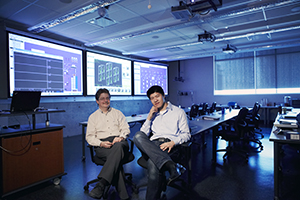Nuclear Engineering (PhD program)
Overview
 The main objective of this doctoral program is to prepare graduates for a career in research and/or teaching in academia or industry; leadership positions that require problem solving skills with highly specialized knowledge often in interdisciplinary fields; or positions involving management of finances, projects and people.
The main objective of this doctoral program is to prepare graduates for a career in research and/or teaching in academia or industry; leadership positions that require problem solving skills with highly specialized knowledge often in interdisciplinary fields; or positions involving management of finances, projects and people. The main objective of the
Fields
- Nuclear Power and Energy Applications
- Radiological and Health Physics
Admissions
Admissions
- Completion of a Master of Applied Science (MASc) level degree in engineering from a Canadian university, or its equivalent from a recognized institution.
- A minimum B+ average (GPA: 3.3 on a 4.3 scale or 77 to 79 per cent).
Required supporting documents:
See the checklist of required documents for a list of supporting documentation that must be submitted with your application.
Important note: The Department of Energy and Nuclear Engineering does not accept potential supervisors as referees for graduate studies applications. Please visit the letters of recommendation page for further details.
Additional requirements:
Prior to being accepted into the program, PhD applicants must be accepted by a professor who specializes in the applicant’s desired area of research and is willing to act as a supervisor.
Required test scores for English language proficiency
See English language proficiency for the minimum required test scores for this program.
Applications for admission to all graduate studies programs are submitted online. There are five steps you must go through to complete the application process. See application process and requirements for step-by-step instructions.
Many of our graduate programs are extremely competitive; the number of qualified applicants normally exceeds the number of seats available for each intake. Satisfaction of minimum entry requirements does not ensure admission.
Research areas
- Energy and material flows for sustainable cities
- Energy systems analysis
- Health physics, threat detection and security
- Instrumentation and control, safety systems
- Microgrids and energy management
- Nuclear and energy data analytics, modeling and simulations
- Nuclear fuel cycle, materials, waste and plant chemistry
- Nuclear power systems
- Nuclear reactor instrumentation, control and simulation
- Nuclear reactor materials and corrosion
- Nuclear reactor physics
- Nuclear reactor safety
- Nuclear reactor systems
- Nuclear reactor thermal hydraulics and heat transfer
- PRA/PSA, risk management, nuclear security
- Radiation protection and measurement
- Radioactive waste management
Learn more about the research areas within this program and find research experts by visiting the faculty’s website and the university's Expert Centre.
Additional information
- ENGR 5510G – Foundations of Software Engineering
- ENGR 5520G – Software Development Methods and Tools
- ENGR 5590G – Software Engineering Studio
- ENGR 5550G - Software Testing and Quality Assurance
- ENGR 5560G - Software Security and Dependability
- ENGR 5740G - User Interface Design
- ENGR 5785G - Real-Time Data Analytics for Internet of Things
Please note that courses are subject to change without notice.
Internal awards and funding
Applicants to research-based graduate programs who are studying full-time are automatically considered for some types of funding at the time of admission.
Types of funding that do not require an application:
- Entrance scholarships
- Minimum funding packages
- Teaching assistantships, research assistantships and graduate research assistantships
For more details on the above funding opportunities, see graduate student awards and funding.
Please note: Part-time students are not eligible for the above funding opportunities.
External awards and funding
Graduate program applicants are encouraged to apply for external awards to help finance their education. The application process differs for each competition, so review the information carefully to determine where and when you must apply. Please note: The majority of these awards are for domestic or permanent residents only.
Tuition fees for graduate programs are charged on a flat-fee or fee-per-credit basis and vary by program and student status.
For current, specific fees and details on flat-fee versus fee-per-credit programs, please see tuition and fees.
Contact the program:
Faculty of Engineering and Applied Science
905.721.8668 ext. 5477
grad.engineering@ontariotechu.ca
Contact the School of Graduate and Postdoctoral Studies:
905-721-3190
connect@ontariotechu.ca